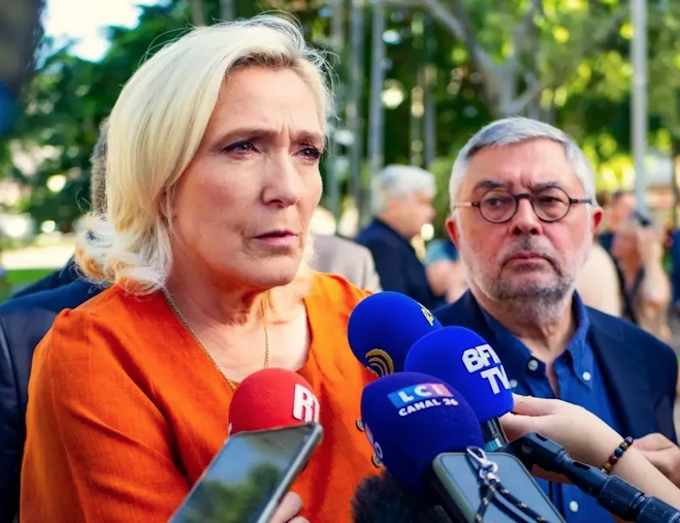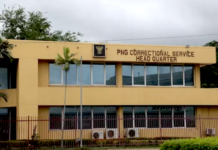
By Patrick Decloitre, RNZ Pacific correspondent French Pacific desk
French national politicians have been in New Caledonia as the territory’s future remains undecided.
Leaders from both right-wing Les Républicains (LR) and Rassemblement National (RN), — vice-president François-Xavier Bellamy and Marine Le Pen respectively — have been in the French Pacific territory this week.
They expressed their views about New Caledonia’s political, economic and social status one year after riots broke out in May 2024.
Since then, latest attempts to hold political talks between all stakeholders and France have been met with fluctuating responses, but the latest round of discussions earlier this month ended in a stalemate.
This was because hardline pro-France parties regarded the project of “sovereignty with France” offered by French Overseas Minister Manuel Valls was not acceptable. They consider that three self-determination referendums held in 2018, 2020 and 2021 rejected independence.
However, the last referendum, in December 2021, was largely boycotted by the pro-independence movement and its followers due to indigenous Kanak cultural concerns around the covid-19 pandemic.
The pro-France camp is accusing Valls of siding with the pro-independence FLNKS bloc and other more moderate parties such as PALIKA (Kanak Liberation Party) and UPM (Union Progressiste en Mélanésie), who want independence from France.
Transferring key powers
Valls is considering transferring key French powers to New Caledonia, introducing a double French/New Caledonian citizenship, and an international standing.
The pro-France camp is adamant that this ignores the three no referendum votes.
Speaking to a crowd of several hundred supporters in Nouméa on Tuesday evening, Bellamy said he now favoured going ahead with modifying conditions of eligibility for voters at local provincial elections.
The same attempts to change the locked local electoral roll — which is restricted to people residing in New Caledonia from before November 1998 — was widely perceived as the main cause for the May 2024 riots, which left 14 dead.
Bellamy said giving in to violence that erupted last year was out of the question because it was “an attempt to topple a democratic process”.
Les Républicains, to which the Rassemblement-LR local party is affiliated, is one of the major parties in the French Parliament.
Its newly-elected president Bruno Retailleau is the Minister for Home Affairs in French President Emmanuel Macron’s coalition government.
Nouméa Accord ‘now over’
Bellamy told a crowd of supporters in Nouméa that in his view the decolonisation process prescribed by the 1998 Nouméa Accord “is now over”.
“New Caledonians have democratically decided, three times, that they belong to France. And this should be respected,” he told a crowd during a political rally.
In Nouméa, Bellamy said if the three referendum results were ignored as part of a future political agreement, then LR could go as far as pulling out of the French government.
Marine Le Pen, this week also expressed her views on New Caledonia’s situation, saying instead of focusing on the territory’s institutional future, the priority should be placed on its economy, which is still reeling from the devastation caused during the 2024 riots.
The efforts included diversifying the economy.
A Paris court convicted Le Pen and two dozen (RN) party members of embezzling European Union funds last month, and imposed a sentence that will prevent her from standing in France’s 2027 presidential election unless she can get the ruling overturned within 18 months.
The high-profile visits to New Caledonia from mainland French leaders come within two years of France’s scheduled presidential elections.
And it looks like New Caledonia could become a significant issue in the pre-poll debates and campaign.
LFI (La France Insoumise), a major party in the French Parliament, and its caucus leader Mathilde Panot also visited New Caledonia from May 9-17, this time mainly focusing on supporting the pro-independence camp’s views.
Macron invites all parties for fresh talks in Paris
On Tuesday, May 27, the French President’s office issued a brief statement indicating that it had decided to convene “all stakeholders” for fresh talks in Paris in mid-June.
The talks would aim at “clarifying” New Caledonia’s economic, political and institutional situation with a view to reaching “a shared agreement”.
Depending on New Caledonia’s often opposing political camps, Macron’s announcement is perceived either as a dismissal of Valls’ approach or a mere continuation of the overseas minister’s efforts, but at a higher level.
New Caledonia’s pro-France parties are adamant that Macron’s proposal is entirely new and that it signifies Valls’ approach has been disavowed at the highest level.
Valls himself wrote to New Caledonia’s political stakeholders last weekend, insisting on the need to pursue talks through a so-called “follow-up committee”.
It is not clear whether the “follow-up committee” format is what Macron has in mind.
But at the weekend, Valls made statements on several French national media outlets, stressing that he was still the one in charge of New Caledonia’s case.
“The one who is taking care of New Caledonia’s case, at the request of French Prime Minister François Bayrou, that’s me and no one else,” Valls told French national news channel LCI on May 25.
“I’m not being disavowed by anyone.”
Local parties still willing to talk
Most parties have since reacted swiftly to Macron’s call, saying they were ready to take part in further discussions.
Rassemblement-LR leader Virginie Ruffenach said this was “necessary to clarify the French state’s position”.
She said the clarification was needed, since Valls, during his last visit, “offered an independence solution that goes way beyond what the pro-independence camp was even asking”.
Local pro-France figure and New Caledonia’s elected MP at the French National Assembly, Nicolas Metzdorf, met Macron in Paris last Friday.
He said at the time that an “initiative” from the French president was to be expected.
Pro-independence bloc FLNKS said Valls’ proposal was now “the foundation stone”.
Spokesman Dominique Fochi said the invitation was scheduled to be discussed at a special FLNKS convention this weekend.
Valls’ ‘independence-association’ solution worries other French territories
Because of the signals it sends, New Caledonia’s proposed political future plans are also causing concern in other French overseas territories, including their elected MPs in Paris.
In the French Senate on Wednesday, French Polynesia’s MP Lana Tetuanui, who is pro-France, asked during question time for French Foreign Affairs Minister Jean-Noël Barrot to explain what France was doing in the Pacific region in the face of growing influence from major powers such as China.
She told the minister she still had doubts, “unless of course France is considering sinking its own aircraft carrier ships named New Caledonia, French Polynesia and Wallis and Futuna”.
French president Emmanuel Macron has been on a southeast Asian tour this week to Vietnam, Indonesia and Singapore, where he will be the keynote speaker of the annual Shangri-La Dialogue.
He delivers his speech today to mark the opening of the 22nd edition of the Dialogue, Asia’s premier defence summit.
The event brings together defence ministers, military leaders and senior defence officials, as well as business leaders and security experts, from across the Asia-Pacific, Europe, North America and beyond to discuss critical security and geopolitical challenges.
More specifically on the Pacific region, Macron also said one of France’s future challenges included speeding up efforts to “build a new strategy in New Caledonia and French Polynesia”.
As part of Macron’s Indo-Pacific doctrine, developed since 2017, France earlier this year deployed significant forces in the region, including its naval and air strike group and its only aircraft carrier, the Charles de Gaulle.
The multinational exercise, called Clémenceau 25, involved joint exercises with allied forces from Australia, Japan and the United States.
This article is republished under a community partnership agreement with RNZ.











































